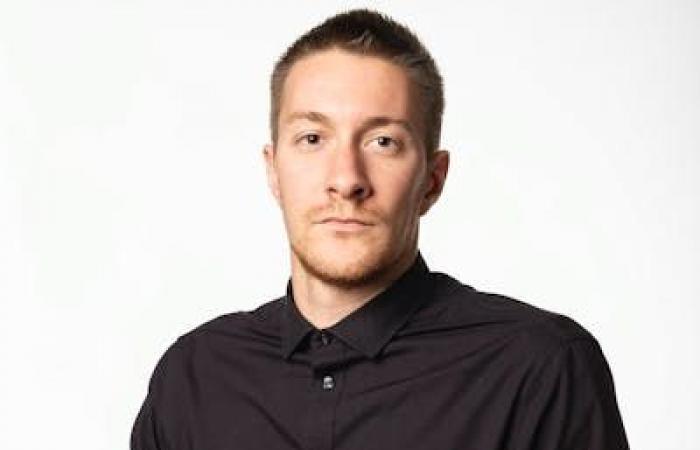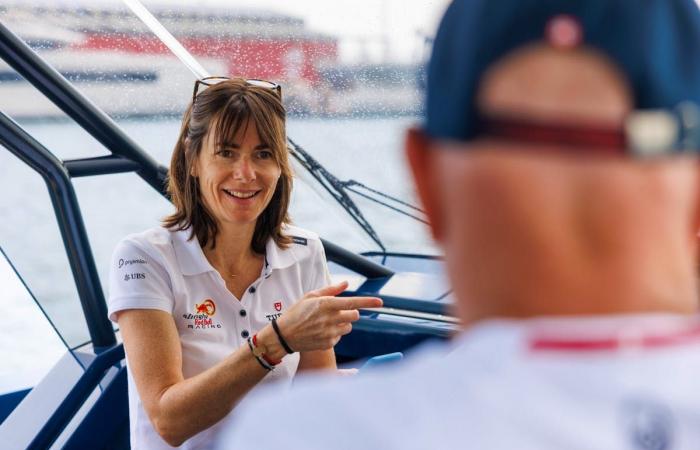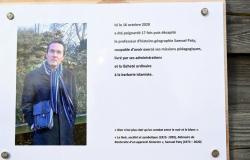Coraline Jonet has won the D35 championship seven times on Lake Geneva as well as the Bol d’Or in 2011 and 2017.
Alexandre Carabi / Alinghi Red Bull Racing
Behind her screen, Coraline Jonet does not shy away from her pleasure a few hours before the big challenge. Because it is a strong moment for the world of sailing and an anomaly that is starting to repair itself, giving women who race more experience on technological boats. After 173 years of existence, the America’s Cup, which awards one of the oldest trophies in sport, has been offered in a women’s version for its 37th edition: the Puig Women’s America’s Cup.
A Swiss team will take to the water on Saturday off the coast of Barcelona against, initially, the five other teams from the America’s Cup, historic rivals like New Zealand, the United Kingdom, the United States -United States, France, and Italy. There are also six “guest” teams (Spain, Netherlands, Canada, Germany, Sweden and Australia). A big step forward in a very conservative environment.
“This is in line with what we saw at the Olympic Games, with parity between men and women, mixed events,” underlines Coraline Jonet, head of the Youth & Women project at Alinghi Red Bull Racing. It’s great to create the same opportunities for those who want to access positions on the America’s Cup boats. And what also helps is that the physical no longer enters into the equation.”
Universe to understand
Unlike sailors, who will fight until mid-October, women will not have to grind their arms or legs to propel their boat on the water. Everything will be played out with batteries which provide the energy to raise and lower the foils and adjust the sails. And the sixth sense of sailors. “The difference with the America’s Cup where you have to design and build your boat is that all the Youth and Women teams use the same boat. (editor’s note: an AC40). Women are all on an equal footing at the start, specifies Coraline Jonet. In racing, it is then cognitive skills and experience that will make the differences.”
After a six-month long selection process and training since the beginning of the year, Nathalie Brugger, Anja von Allmen, Laurane Mettraux and Alexandra Stalder will have to give enough speed to a 12 meter high monohull so that it “foile”, that is to say that it flies and that the body of the device does not rub when in contact with water. On board, they will have to face a particularity: the sails touch the deck and prevent the duos on port and starboard from seeing each other. “You don’t see half of the body of water, nor your partners on the other side of the bridge,” continues Coraline Jonet. So you navigate with your feelings, the information transmitted by the other pair and with figures such as the speed of the boat, the angle it has in relation to the wind, the position of the buoys and the competitors. A whole universe to grasp.
Egos stay at the dock
At the front, there are helmsmen who press buttons to manage the foils. At the rear, the other two adjust the sails, putting more or less tension on one side or the other. All are in a bucket seat with headset and microphone. Since they cannot see each other, the emphasis has been placed on communication. It is necessary to describe precisely what we see, what we feel, but also for the interpretation to be perfect in the opposite camp. “We have French-speaking people, German-speaking people and even an Italian. We chose English to speak, which adds a little challenge, concedes Coraline Jonet. But they learned to know each other, to trust each other. Egos cannot be a hindrance.”
The four starters and the two substitutes, Maja Siegenthaler and Marie Mazuay, have been together for two months in Barcelona. When they’re not spending hours in a simulator, they find themselves in the same apartment. “They have to live together, while each having their own room,” smiles Coraline Jonet. Over time, routines become established. Some have their own spot to drink coffee, others to have brunch. You also have to leave a certain amount of freedom for the alchemy to take place.”
This human adventure will come to an end after the competition, at the start of the week. “It’s a very short format, between two and four days if you go all the way to the final. There will be helicopters, interviews. The pressure will suddenly increase. But they are well prepared, puts Coraline Jonet into perspective, all smiles as history prepares to be written before her eyes. For the women who are going to race, it will be memorable.”







